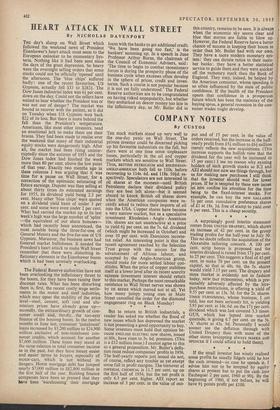HEART ATTACK IN WALL STREET
By NICHOLAS DAVENPORT
THE day's slump on Wall Street which followed the weekend news of President Eisenhower's heart attack must seem to the European onlooker to be momentary hys- teria. Nothing like it had been seen since the days of the great depression. So heavy were the overnight selling orders that some stocks could not be officially 'opened' until the afternoon. The 'blue chips' suffered badly : one of the recent favourites, US Gypsum, actually fell $33 to $2824. The Dow Jones industrial index was 64 per cent. down on the day. Could not the sellers have waited to hear whether the President was or was not out of danger? The market was bound to recover with the patient, as it did on Tuesday when US Gypsum won back $22 of its loss. But there is more behind the fall than the President's temperature. Americans, like most other investors, need an emotional jerk to make them use their brains. They had been made to realise over the weekend that many of their industrial equity stocks were dangerously high. After all, the market had been rising uninter- ruptedly since the autumn of 1953 and the Dow Jones index had finished the week more than 80 per cent. above the low point of that year. Exactly two months ago in these columns I was arguing that it was time for a pause on Wall Street, for a correction of the optimistic estimating of future earnings. Dupont was then selling at about thirty times its estimated earnings for 1955, its dividend yield being 2.3 per cent. Many other 'blue chips' were quoted on a dividend yield basis of under 3 per cent, and some were even under 2 per cent. What had carried the market up to its last week's high was the large number of 'splits' -the equivalent of our share bonuses- which had recently been announced, the most notable being the three-for-one of General Motors and the five-for-one of US Gypsum. Moreover, the business news had fostered market bullishness. It needed the President's heart attack to make Wall Street remember that there were disturbing in- flationary elements in the Eisenhower boom which it had been unwisely overlooking.
The Federal Reserve authorities have not been overlooking the inflationary threat to the boom, for they have been raising their discount rates. What has been disturbing them is, first, the recent costly wage settle- ments in the motor and steel industries, which may upset the stability of the price level-steel, cement, soft coal and alu- minium prices have already gone up- secondly, the extraordinary growth of con- sumer credit and, thirdly, the too-easy finance of the housing boom. In the twelve months to June last, consumer 'instalment' loans increased by $3,200 million to $24,900 million exclusive of non-instalment con- sumer credits, which account for another $7,600 million. These loans may stand at the same relation to total consumer income as in the past, but they have meant easier and easier terms to buyers, especially of motor-cars, which is not without its dangers. Home mortgage debt has jumped nearly $7,000 million to $82,800 million in the first half of the year. Building finance companies have been so pressed that they have been 'warehousing' their mortgage
loans with the banks to get additional credit. 'We have been going too fast,' is the bankers' summing up. In a speech in June Professor Arthur Burns, the chairmah of the Council of Economic Advisers, said : 'The time to begin to combat recessionary forces is during the prosperity phase of the business cycle when excesses often develop in the sphere of prices, credit and inven- tories. Such a course is not popular because it is not yet fully understood.' The Federal Reserve authorities are to be congratulated on having risked unpopularity, but whether they embarked on dearer money too late in the inflationary day, as Mr. Butler did in this country, remains to be seen. It is always when the economic sky seems clear and blue that storms are liable to blow up. However, the Federal Reserve have a better chance of success in keeping their boom in order than Mr. Butler had with our own. They have a more modern monetary sys- tem: they can dictate ratios to their mem- ber banks : they have a better statistical service to guide them and they were quicker off the monetary mark than the Bank of England. They may, indeed, be helped by the American consumer, whose spending is so often influenced by the state of public confidence. If the health of the President upsets that confidence in a prosperous future which has been the mainstay of the buying spree, a general recession in the con- sumer trades might develop.


































 Previous page
Previous page